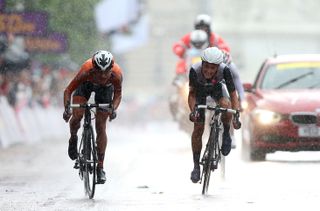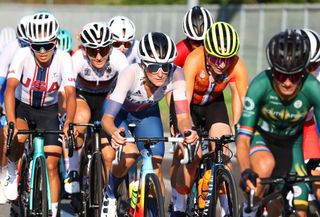For Lizzie Deignan, the Olympic Games have always hit differently. “Ask a cyclist what is more important, the rainbow bands or Olympic gold, and they’d say the rainbow bands without a doubt,” the Yorkshirewoman says. “But I’d struggle with that question because when I was growing up there was no women’s cycling on my TV, and no heroes for me to follow. But I did have Denise Lewis winning the Olympics in the heptathlon on my TV. For that reason, the Olympics are really special for me.”
Deignan’s early season plans for 2024 were scuppered after she broke her arm at the Tour of Flanders on 31 March – amazingly the 35-year old’s first broken bone in 15 years of pro cycling. However, she’s got plenty of time to bounce back from this setback, in time for what will be her fourth consecutive Games. Deignan will lead the Great Britain women’s team in the road race, on 4 August, her last shot at landing a coveted gold medal.
Her Olympic appearances span 12 years and each has represented a different Lizzie: she has developed from being track world champion to fast finisher on the road; to gritty all-rounder and world champion road racer; to the do-it-all, highly skilled rouleur and Classics winner she is known as today. In terms of her public image, she has been many things too: Britain’s golden girl who could do no wrong; subject of scrutiny after missed whereabouts tests in 2015 and 2016 (successfully challenged in the Court of Arbitration for Sport); and more recently as the super-mum of two young children.
With excitement starting to build towards the Paris Games, Cycling Weekly sat down with Deignan to chart an Olympic journey she clearly still holds dear. “Never mind the medals, just to say you were an Olympian once, let alone four times, is something to be really proud of,” she says.
Lionised in London
When Lizzie Armitstead, as she was then, took to the start line of London 2012, she had already won one battle: the right to GB leadership. She had taken that title from Nicole Cooke, who four years earlier won road race gold. Th e 23-year-old from Otley had convinced coach Chris Newton that she was the faster – and that the course around Surrey and London suited a sprinter.

Lizzie Deignan sprints to second at the London Olympics in 2012
(Image credit: Getty Images)
On the morning of the race, 29 July 2012, expectations were even higher than expected: “It was the men’s road race the day before, and Cav had ‘failed’ to win gold,” she says, adding air quotes around the contentious word. “I wasn’t expecting to medal so there hadn’t been any pressure on my shoulders before, but then all of a sudden there was.”
At two-thirds race distance, with just over 40km to go, Deignan attacked on the final descent of Box Hill, bringing Marianne Vos and Olga Zabelinskaya with her. In the sprint on The Mall, Vos took gold and Deignan silver. “I delivered silver, the first GB medallist of the home Games, so everything was good again.”
The latest race content, interviews, features, reviews and expert buying guides, direct to your inbox!
At the time, she tweeted that it was the “best day of my life”. More than a decade on, she stands by those words. “Nothing will ever beat 2012,” she smiles. “Everyone in the UK was just happy.
It was a special time – a summer that everyone remembers. To be part of that as a sportsperson, to pull off an Olympic medal at a home Games, was phenomenal. It was an overwhelming experience.”
Brouhaha in Brazil
Three Olympic road races
London 2012 – silver
In a rain-soaked three-way finish on The Mall, Marianne Vos opened up the sprint and held off the challenge of a young Deignan.
Rio 2016 – 5th
Despite a big climb in the closing stages, Deignan made it over with the main contenders, but just missed out on another podium finish.
Tokyo 2021 – 11th
Anna Kiesenhofer’s incredible win from the break meant that Deignan and the rest of the peloton were left to fight for scraps and minor places.
The Olympic cycle between London and Rio brought with it an ever increasing number of victories for Deignan: there were wins in the biggest of the Classics, success in stage races, national titles, and then the rainbow bands in 2015. “I won a lot in that period,” she says. Olympic gold in Rio, however, wasn’t as likely as the press were making out. “The course was really mountainous, it wasn’t ideal and didn’t suit me,” she says.

Deignan after taking 5th in Rio
(Image credit: Getty Images)
Nevertheless, she was still being hyped, and on arrival in Rio Deignan was thrust into the centre of a storm. “I got off the plane and I was surrounded by paparazzi,” she remembers. “I immediately had a security guard assigned to me.” Four weeks before the road race, UK Anti-Doping (UK AD) had provisionally suspended the then world champion for missing three out of-competition tests in the previous 12 months. She successfully appealed to the Court of Arbitration for Sport that the UK AD official had not made sufficient efforts to contact her on the first missed test, clearing her to race. This was confidential information, but it was leaked to the press on the day she travelled to Brazil.
“Because of all that, Rio was a very weird experience,” she says. “We didn’t stay in the village and felt far away from everything. It was really strange.” Deignan managed to put the distraction behind her, though, and rode to fifth, just 20 seconds off the podium finishers. “I did as best as I could,” she sums up.
Tokyo Twosome
By the time of the Covid-delayed Tokyo Games in 2021, Armitstead had become Deignan, having married former Team Sky rider Philip Deignan in September 2016. She was also a mother to Orla, who was born in 2018. “In five years, a lot had changed,” she says.

(Image credit: Getty Images)
She had made an incredible return to form post-pregnancy, winning the Women’s Tour, La Course, Liège-Bastogne-Liège and the Tour de Suisse. The Tokyo course was hilly but not beyond her capabilities. What was difficult, however, was the hand GB had been dealt. “We only qualified two spots for Tokyo,” she says. “So there was only me and Anna Shackley. It’s a double-edged sword because if you have a stronger team, you have a stronger chance of winning, but if there’s more competition you’re not guaranteed leadership.”
The Netherlands had four potential winners, and Deignan grew increasingly frustrated when they refused to chase breakaway rider Anna Kiesenhofer. “I was watching Anna riding up the road and telling the Dutch to chase because I couldn’t impact the race. Only having one team-mate was a hindrance.” Remarkably, Kiesenhofer, an amateur rider and mathematician, won by more than a minute, while Deignan finished 11th. “Anna, who I didn’t know, winning and it being a pandemic experience made Tokyo really unique.”
Paris is calling
Deignan’s Olympic journey will finish in Paris – that she is clear about. Could there be a golden farewell? “From what I’ve seen of the parcours, I really like it,” she says. “It’s reminiscent of London. It’s going to be hard but I will be a contender.” And this time GB has four spots. The big difference from Tokyo is that Deignan is now a mother of two, having given birth to a son, Shea, in 2022. So what form will she bring to her final Olympics? Sixth place at last August’s Glasgow Worlds gave Deignan confidence, she says, and “going into Paris, I stand a good chance of being able to pull something off.”
Will the kids be there to see mummy cross the line? “I was speaking with Phil about this and he replied, ‘Really? Paris with two kids?’ I said, ‘Pull yourself together, it might be a rough day for you, but it’ll be worth it for the memories.’ Imagine people asking me where Phil and the kids are and I have to say he said it’s too much hassle and he can’t be arsed!”

